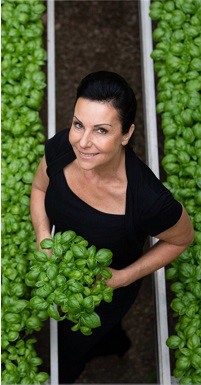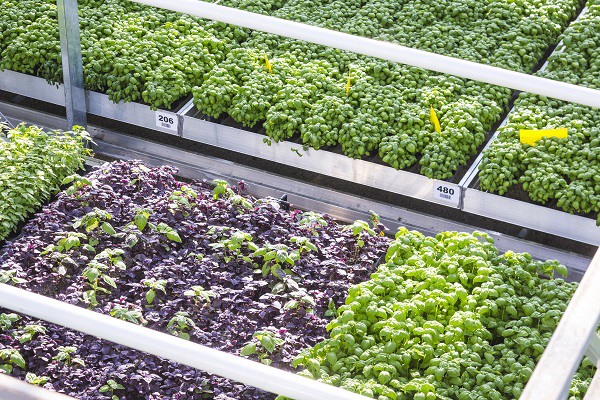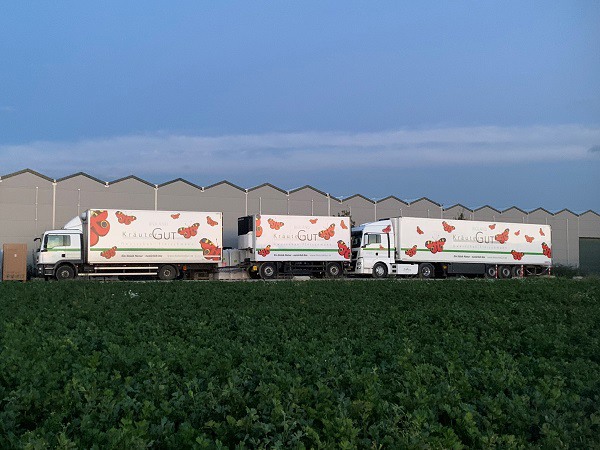The Bioland  Kräutergut Dworschak-Fleischmann offers some 240 different organic-vegan herb varieties. "I am not a vegan myself, but I want to offer an honest organic-vegan product, which is why we do not use animal fertilizers," Managing Director Tanja Dworschak tells us. Only certain herbs, such as rosemary, chives, curry herb, and lavender, are still fertilized with horn shavings.
Kräutergut Dworschak-Fleischmann offers some 240 different organic-vegan herb varieties. "I am not a vegan myself, but I want to offer an honest organic-vegan product, which is why we do not use animal fertilizers," Managing Director Tanja Dworschak tells us. Only certain herbs, such as rosemary, chives, curry herb, and lavender, are still fertilized with horn shavings.
The main rotations at her herb company are basil, parsley, and chives, which the company offers year-round. "The chives my brother produces for us outdoors. In the fall, they are stored, frozen, and thawed daily as needed."
6.5 million potted herbs a year
"Some of our herbs are produced on 5,600 m2 at the old farm, of which about 800 m2 are double- to six-story, including a germination room. Furthermore, we have a 14,000 m2 cold storage facility. In 2010, the plant started a pilot project of double-story production, and in 2015 built a 7,200 m2 plant on two levels, with a 13,000 m2 production area. We produce a total of 6.5 million potted herbs.
Organic herbs since 1994
In 1994, the herb company began to convert its production to organic. "At that time, apart from horn shavings, there was no other organic fertilizer. There were also hardly any pesticides, microorganisms, etc. So it wasn't easy to convert to organic." In the first year, Dworschak still had to sell organic herbs as conventional goods. In 1995, the EU organic seal or BCS certification was added, and then Bioland and later Naturland in 1996.
To expand the range, Dworschak offers strawberry, raspberry, and blackberry plants in the spring. "Adapting our products to the Bioland guidelines means thinking more about the well-being of people and nature. This includes the fact that 20 percent of our employees are people with disabilities and another 20 percent are 'hard-to-place' people," Dworschak says.

Ice plant, jiaogulan, Jamaica thyme, and more
The products are marketed primarily to (organic) specialty retailers, discounters, and traditional food retailers. "For markets and farm stores interested in special herbs, we also offer ice plant, jiaogulan, Jamaica thyme, and more. We try to offer specialty retailers products that allow them to expand their variety, so the end customer can find unusual herbs that aren't available at discount stores." Kräutergut sells its goods in Germany, Austria, and Switzerland, with the majority sold in the region or in southern Germany.
Increased production costs
"Electricity prices have quadrupled for us. The price of gas has increased many times over for one of two parts of the business, although at least for one part of the business, the price of gas remained this year." The herb producer also knows of farms that are also involved in pot production and have stopped working in the winter, however, because of the cost of energy, she said. Additional costs also arise from the increased minimum wage, especially since organic production already incurs about 20 percent more costs than conventional production. "Now that you don't have to do a lot of heating, production is also starting to pick up again at these farms."
grow2Show: city kids meet agriculture
"We founded the grow2show brand a few years ago. With it, we want to offer city kids the opportunity to get to know vegetable production better. From wild strawberries to Mexican mini cucumbers and similar Lilliputian products: Children can enjoy a piece of vegetable production on the windowsill in their own homes. Especially during the pandemic, this was very well received. It's important to pass on the appreciation in food, especially beyond the appearance of the product."

Photos: KräuterGut Dworschak-Fleischmann
For more information: Tanja Dworschak
Tanja Dworschak
Bioland KräuterGut Dworschak-Fleischmann
Moosfeldweg 8
90427 Nürnberg / Kraftshof
Tel.: 0911 / 93 64 76 -1
Fax: 0911 / 93 64 76 -0
Email: [email protected]
https://kraeutergut.de










